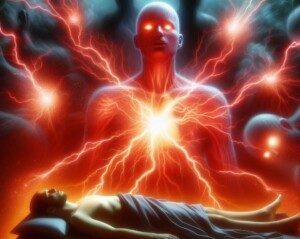Are you afraid to fall asleep after having heart palpitations all day?
Is it possible to die from cardiac arrest during sleep caused by a palpitation?
Heart palpitations are understandably unnerving – because you can feel them.
Sometimes they feel as though your heart stopped beating, as though the pause button was hit.
A palpitation can feel like a thumping, a fluttering or quivering, a skipped beat or an extra beat.
But is there anything unique about sleep, such that if palpitations occur during this time, they’re especially dangerous?
“It would be VERY unusual for someone to die in their sleep from palpitations,” says Geoffrey Barnes, MD, cardiologist and vascular medicine specialist at the University of Michigan Health System.
“The two most common cardiac causes of palpitations (PVCs and A-Fib) are not risk factors for sudden death.
“Patients who are at risk of sudden cardiac death from heart rhythm problems are those who have severe forms of heart failure or genetic abnormalities impacting their heart.
“These patients are recommended to have a defibrillator. Palpitations are usually not a major symptom for these patients.”
A-Fib (atrial fibrillation) is a major risk factor for an ischemic stroke (blood clot in the brain), which can kill a person.
Heart failure means that the heart’s pumping action is weak.
A person will almost always already know that they have heart failure due to its symptoms: fatigue, frequent shortness of breath and often, swelling in the lower legs and feet.
As for a genetic abnormality of heart rhythm that can cause sudden death, this would be long QT syndrome or Brugada syndrome: conditions one is born with — though certain medications can lengthen the QT interval (revealed on an EKG)..
Though LQTS and Brugada syndrome (both rare) can cause palpitations, the vast majority of subjective irregular heartbeats are not caused by these congenital disorders.
You can die in your sleep from sudden cardiac arrest, but this would not be related to the premature ventricular contraction (PVC) or an episode of A-Fib.
Anxiety is a leading cause of harmless heart palpitations, though if they occur while exercising or consistently soon after exercising, they should be investigated.
Keep in mind that waking from a frightful dream can have you waking with heart palpitations – from the dream, not a disease process.
 Geoffrey Barnes, MD, is a cardiologist and vascular medicine specialist at the University of Michigan Health System and spokesperson for the World Thrombosis Day Campaign. Dr. Barnes’ clinical interests include treatment of vascular disorders, anticoagulation and general cardiac care.
Geoffrey Barnes, MD, is a cardiologist and vascular medicine specialist at the University of Michigan Health System and spokesperson for the World Thrombosis Day Campaign. Dr. Barnes’ clinical interests include treatment of vascular disorders, anticoagulation and general cardiac care.
 Lorra Garrick has been covering medical, fitness and cybersecurity topics for many years, having written thousands of articles for print magazines and websites, including as a ghostwriter. She’s also a former ACE-certified personal trainer.
Lorra Garrick has been covering medical, fitness and cybersecurity topics for many years, having written thousands of articles for print magazines and websites, including as a ghostwriter. She’s also a former ACE-certified personal trainer.
.


























